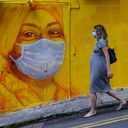Study: "Unusually high rates of respiratory distress" in babies exposed to COVID in pregnancy

The babies of unvaccinated mothers who contract COVID during pregnancy face three times the risk of developing respiratory distress after birth compared to those who weren't exposed.
The big picture: The findings from a University of California, Los Angeles (UCLA)-led study published Thursday add to growing evidence on the impact COVID has on the babies of people who contracted COVID-19 while pregnant and to concerns about longer-term consequences of the virus for infants.
- Other research has found pregnant people with COVID face higher risk for stillbirths and babies have "slightly elevated rates of congenital cardiovascular defects, heart rhythm abnormalities, metabolic disorders, and perinatal respiratory disorders."
Context: 221 mothers enrolled for the study, including 151 (68%) who were unvaccinated before infection. Most participants were Black, Hispanic or Latina.
- None of the babies who were born during a period from April 2020 to August 2022 tested positive for the coronavirus.
- The researchers examined the structure and functions of proteins and how they affected cells in order to trace how serious breathing problems developed following in-utero exposure to COVID.
What they found: "We found unusually high rates of respiratory distress shortly after birth in the full-term babies born to mothers who had COVID-19 during pregnancy," said UCLA pediatric infectious diseases professor Karin Nielsen, in a statement accompanying the study, published in Nature Communications.
- "The mothers had not been vaccinated prior to acquiring COVID, indicating that vaccination protects against this complication," the study co-author added.
- The risk was significantly lower when the infected participants had previously been vaccinated with a least one COVID dose before they were infected.
- The researchers wrote that "not only do our results show higher rates" of respiratory distress in COVID-exposed, uninfected infants when compared to the general population, "but we observed more cases of RD [respiratory distress] at later gestational ages than anticipated, when neonates should presumably have more mature lung anatomy."
By the numbers: The researchers found that 17% of the exposed infants followed in the study had respiratory distress, compared to 5-6% for babies not exposed to COVID.
- Among the unvaccinated participants, 16% experienced severe or critical COVID-19, compared to 4% of those who were vaccinated.
- 21% of babies with respiratory distress "were born to mothers with severe or critical COVID-19, while only 6% of babies without respiratory distress were born to women with severe disease," per a UCLA statement that noted the finding was "statistically significant."
Of note: The researchers warned the results should be interpreted with caution due to the small sample size.
- "The majority of pregnant individuals in our cohort were enrolled from a tertiary and quaternary medical center" that typically deals with the sickest patients, per the researchers.
- "Therefore, our study population may be skewed towards more severe presentations of COVID-19 compared to the general pregnant population."
Yes, but: Kevin Ault, a professor and chair of obstetrics and gynecology at Western Michigan University, told the Scientific American that the thorough design of the study means its conclusions are still significant in spite of these limitations.
Zoom out: Ault, who wasn't involved in the study, noted that research shows vaccinated pregnant people can impart antibodies onto babies that protect them for at least six months.
- A study of 2,261 and 1,940 12- to 18-month-old babies, published in JAMA Pediatrics this week, concludes COVID vaccination during pregnancy is safe for infant neurodevelopment.
The bottom line: Sean O'Leary, chair of the American Academy of Pediatrics' Committee on Infectious Diseases, who wasn't involved in the UCLA-led study, noted to the Scientific American that four years into the pandemic, "we're learning still new things about this virus."
Go deeper: COVID's role in increasing maternal mortality rates